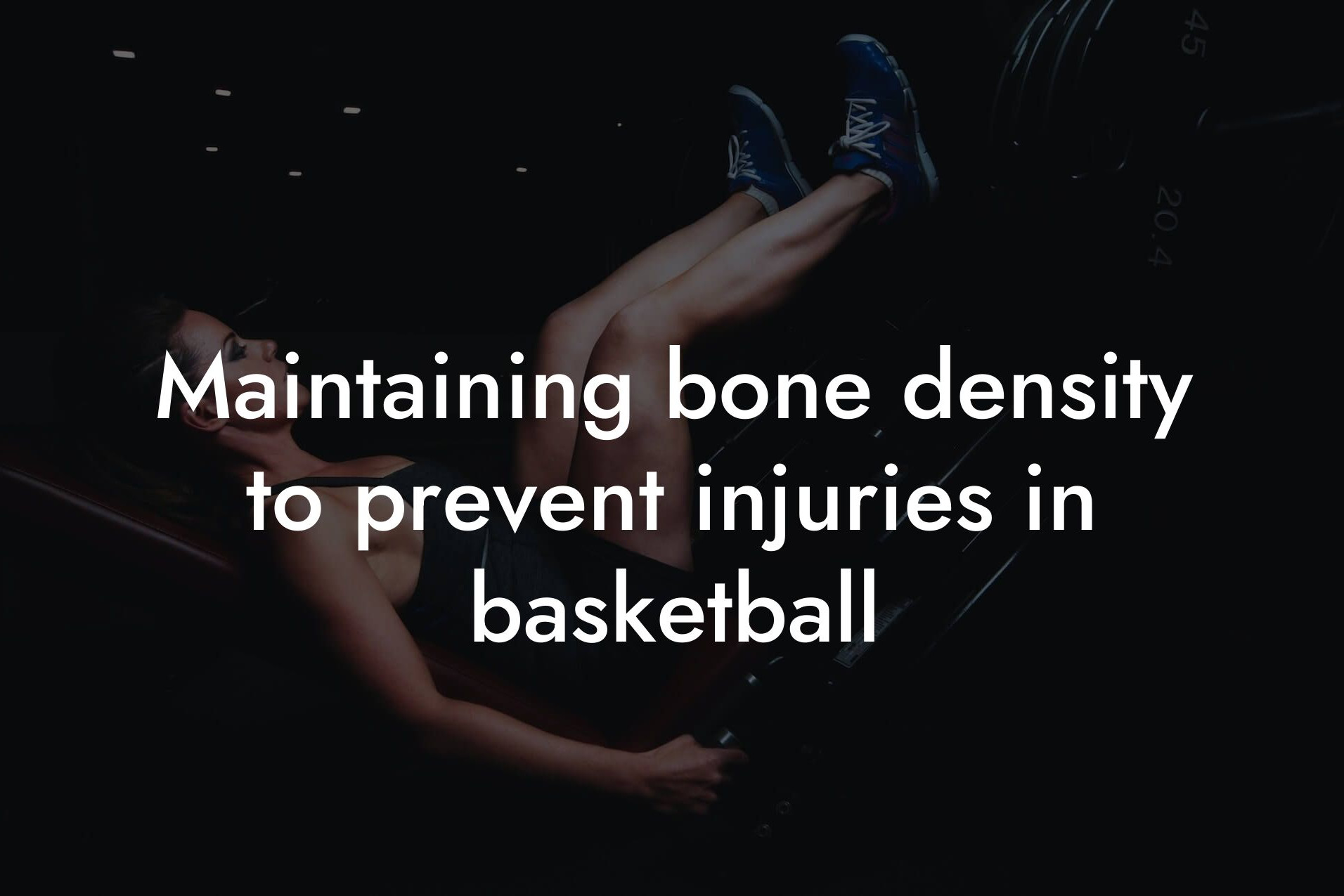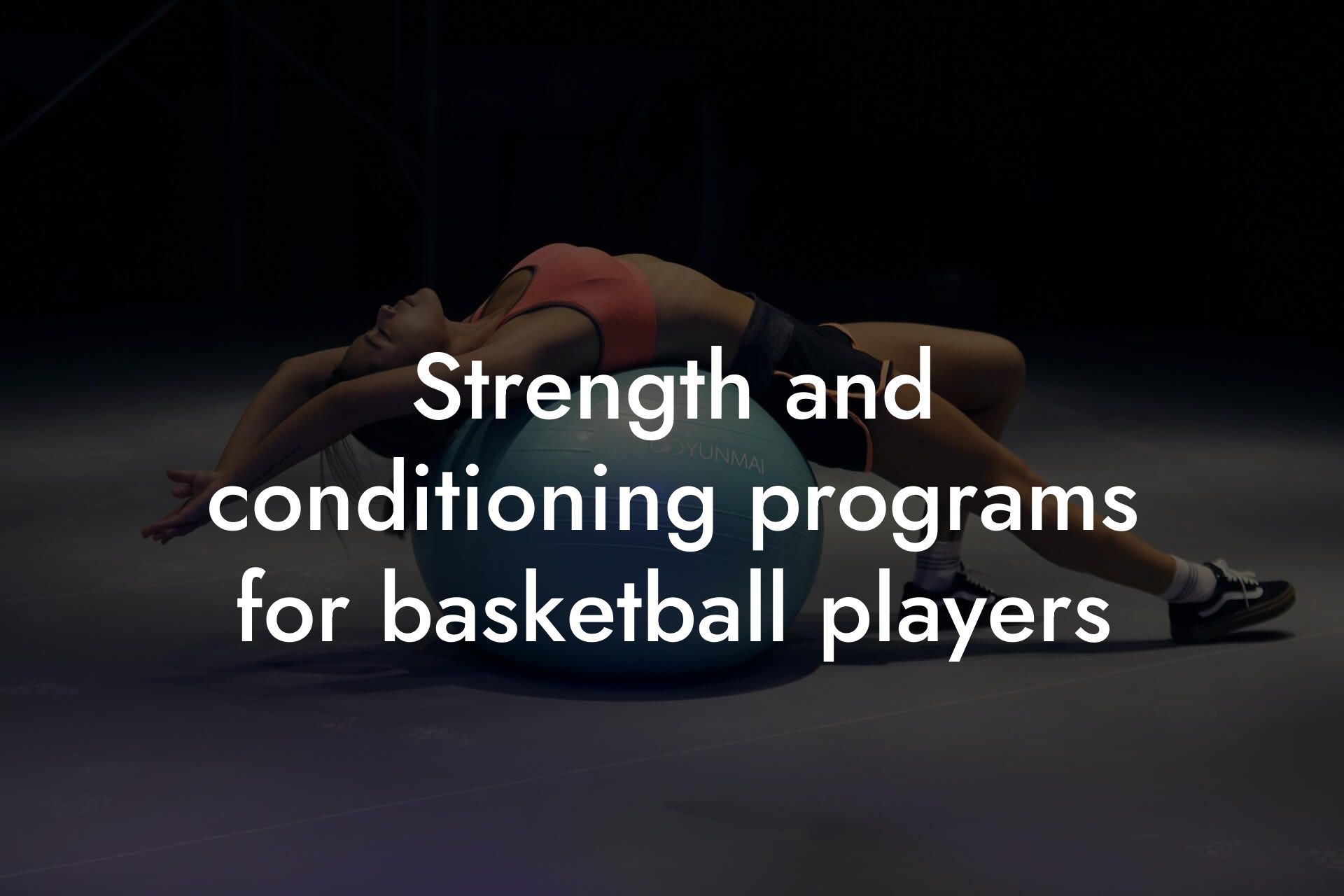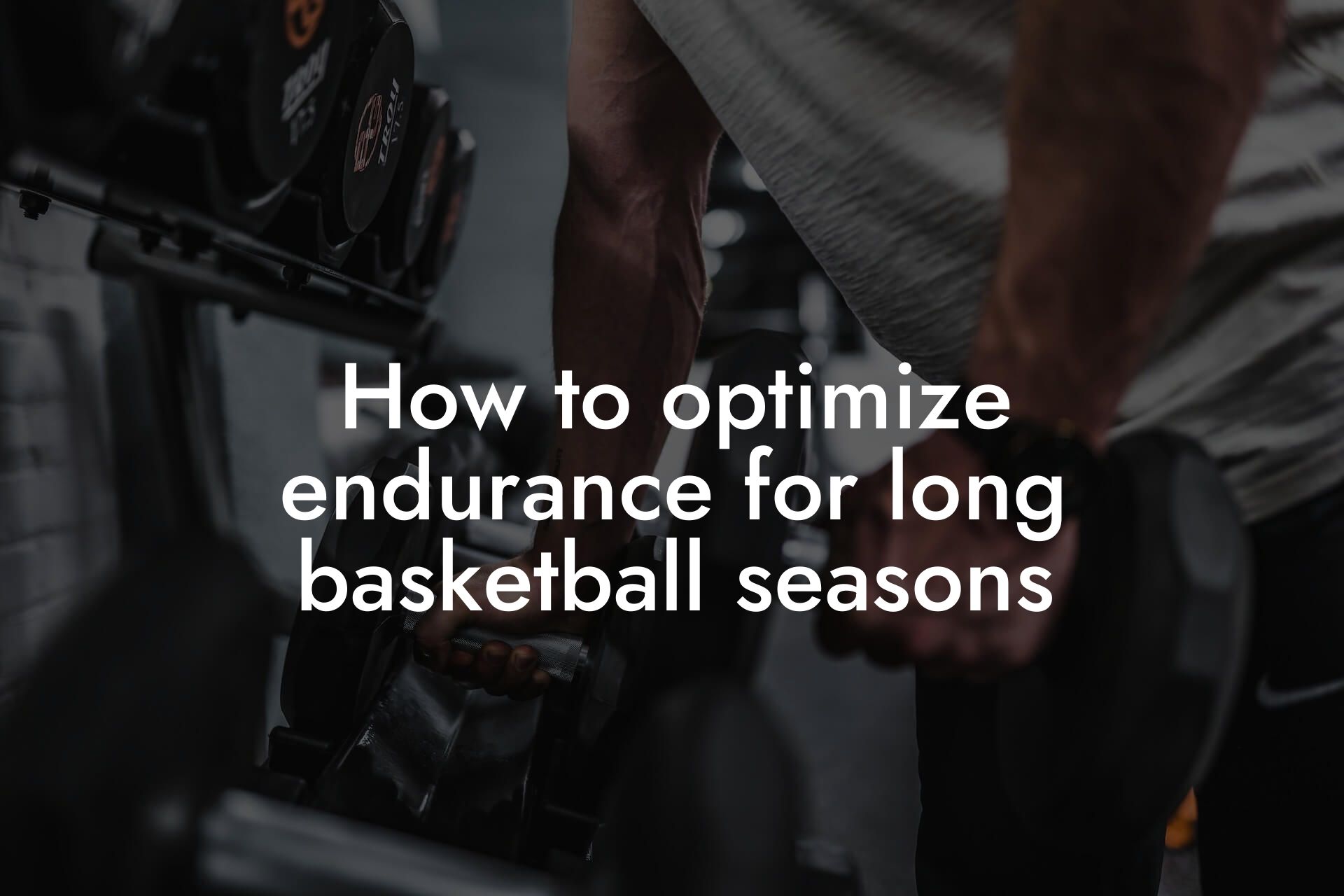Introduction
As a high-earning professional, you understand the importance of maintaining a healthy physique to perform at your best on and off the court. Basketball is a physically demanding sport that requires a combination of strength, speed, agility, and endurance. To optimize your performance, it's essential to fuel your body with the right nutrients and stay hydrated. In this article, we'll explore the importance of hydration and nutrition in basketball, and provide you with actionable tips to take your game to the next level.
Table of Contents
- Introduction
- The Importance of Hydration in Basketball
- How to Stay Hydrated as a Basketball Player
- The Role of Nutrition in Basketball Performance
- Macronutrient Ratios for Basketball Players
- Meal Timing and Frequency for Basketball Players
- Hydration and Nutrition Strategies for Game Day
- Frequently Asked Questions
The Importance of Hydration in Basketball
Hydration is crucial for basketball players, as it affects their performance, recovery, and overall health. Water makes up approximately 60% of an adult's body weight, and even mild dehydration can cause significant declines in athletic performance. When you're dehydrated, you may experience symptoms such as fatigue, dizziness, and headaches, which can negatively impact your game.
Proper hydration is essential for several reasons:
- Regulates body temperature: Hydration helps your body regulate its temperature, which is critical during intense physical activity like basketball.
- Lubricates joints: Water helps keep your joints lubricated, reducing the risk of injury and improving mobility.
- Supports energy production: Hydration is necessary for energy production, which is essential for explosive movements and quick changes of direction on the court.
- Enhances cognitive function: Dehydration can impair cognitive function, leading to decreased focus, concentration, and decision-making skills.
How to Stay Hydrated as a Basketball Player
To stay hydrated, it's essential to drink plenty of water before, during, and after games and practices. Here are some tips to help you stay hydrated:
- Drink at least 8-10 glasses of water per day, and make sure to drink water during meals.
- Monitor your urine output and color: If your urine is dark yellow or you're not urinating frequently enough, it may be a sign of dehydration.
- Avoid sugary drinks and caffeine, which can exacerbate dehydration.
- Bring a water bottle with you to games and practices, and take regular water breaks.
The Role of Nutrition in Basketball Performance
Nutrition plays a critical role in basketball performance, as it provides the energy and nutrients necessary for optimal physical function. A well-balanced diet should include a combination of carbohydrates, protein, and healthy fats.
Carbohydrates are the primary source of energy for basketball players, providing fuel for high-intensity movements and quick bursts of speed. Focus on complex carbohydrates such as whole grains, fruits, and vegetables, which are rich in fiber, vitamins, and minerals.
Protein is essential for muscle growth and repair, which is critical for basketball players who are constantly pushing their bodies to new limits. Aim to consume 1.2-1.6 grams of protein per kilogram of body weight from sources such as lean meats, fish, eggs, dairy, and plant-based options.
Healthy fats are necessary for energy production and can help reduce inflammation. Include sources such as nuts, seeds, avocados, and olive oil in your diet.
Macronutrient Ratios for Basketball Players
The ideal macronutrient ratio for basketball players varies depending on individual factors such as position, playing style, and fitness goals. However, a general guideline is to aim for the following ratios:
- Carbohydrates: 55-65% of daily calories
- Protein: 15-20% of daily calories
- Fat: 20-25% of daily calories
Meal Timing and Frequency for Basketball Players
Meal timing and frequency are critical for basketball players, as they need to fuel their bodies for optimal performance. Aim to eat 3-5 main meals and 2-3 snacks per day, spaced out every 2-3 hours.
- Pre-game meal: Eat a balanced meal 1-2 hours before the game, including complex carbohydrates, protein, and healthy fats. Avoid heavy meals and focus on easily digestible foods.
- Post-game meal: Consume a meal or snack within 30-60 minutes after the game, including carbohydrates and protein to aid in recovery.
Hydration and Nutrition Strategies for Game Day
Game day is a critical time for basketball players, and hydration and nutrition strategies can make all the difference. Here are some tips to help you prepare:
- Start hydrating 24 hours before the game by drinking plenty of water.
- Eat a balanced meal 1-2 hours before the game, and avoid heavy meals and sugary snacks.
- Bring a water bottle with you to the game, and take regular water breaks during timeouts and quarter breaks.
- Consume a post-game meal or snack within 30-60 minutes after the game, including carbohydrates and protein to aid in recovery.
In conclusion, hydration and nutrition are critical components of basketball performance. By staying hydrated and fueling your body with the right nutrients, you can optimize your performance, reduce the risk of injury, and gain a competitive edge. Remember to drink plenty of water, eat a balanced diet, and focus on complex carbohydrates, protein, and healthy fats. With the right hydration and nutrition strategies, you can take your game to the next level and achieve your fitness goals.
At Tano Performance Group, we understand the importance of hydration and nutrition in basketball performance. Our DEXA machine provides a complete body assessment, giving you the information you need to optimize your performance and achieve your fitness goals. Contact us today to learn more about how our services can help you take your game to the next level.
Frequently Asked Questions
What is the importance of hydration in basketball?
Hydration plays a crucial role in basketball performance. Even mild dehydration can cause fatigue, decreased strength, and impaired cognitive function, all of which can negatively impact a player's game. Proper hydration helps regulate body temperature, transport nutrients and oxygen to cells, and remove waste products. In basketball, hydration is essential for optimal physical performance, endurance, and recovery.
How much water should a basketball player drink daily?
The American College of Sports Medicine recommends that athletes drink 17-20 ounces of water 2-3 hours before exercise, and 7-10 ounces every 10-15 minutes during exercise. However, individual hydration needs may vary depending on factors such as climate, intensity of play, and individual sweat rate. A general rule of thumb is to drink at least 8-10 glasses of water per day.
What are the signs of dehydration in basketball players?
Common signs of dehydration in basketball players include dark yellow or amber-colored urine, dry mouth, fatigue, dizziness, headaches, and muscle cramps. If left untreated, dehydration can lead to more severe symptoms such as heat stroke, which can be life-threatening.
How does nutrition impact basketball performance?
Nutrition plays a critical role in basketball performance. A well-balanced diet provides the necessary fuel for optimal physical performance, recovery, and adaptation. A diet rich in complex carbohydrates, lean protein, and healthy fats helps maintain energy levels, supports muscle growth and repair, and enhances overall athletic performance.
What are the best foods for basketball players?
Basketball players should focus on consuming whole, unprocessed foods such as lean meats, fish, eggs, dairy, whole grains, fruits, and vegetables. These foods provide essential nutrients, fiber, and antioxidants that support optimal physical performance and recovery. Additionally, foods high in complex carbohydrates such as brown rice, quinoa, and whole-grain bread provide sustained energy and support muscle function.
What are the worst foods for basketball players?
Basketball players should limit or avoid foods high in added sugars, saturated fats, and sodium. These foods can cause energy crashes, inflammation, and decreased athletic performance. Examples of foods to limit or avoid include sugary drinks, fast food, processed meats, and refined carbohydrates.
How does protein support basketball performance?
Protein is essential for muscle growth, repair, and maintenance. In basketball, protein helps build and repair muscle tissue, which is critical for explosive movements, strength, and endurance. Aim to consume 1.2-1.6 grams of protein per kilogram of body weight daily from sources such as lean meats, fish, eggs, dairy, and plant-based options.
What is the role of carbohydrates in basketball?
Carbohydrates are the primary source of energy for basketball players. They provide fuel for high-intensity movements, support muscle function, and help delay fatigue. Focus on consuming complex carbohydrates such as whole grains, fruits, and vegetables, which provide sustained energy and support overall athletic performance.
How does healthy fat support basketball performance?
Healthy fats, such as omega-3 fatty acids, support heart health, reduce inflammation, and provide energy. In basketball, healthy fats help support endurance, reduce muscle soreness, and enhance overall athletic performance. Include sources of healthy fats such as nuts, seeds, avocados, and fatty fish in your diet.
What is the importance of electrolytes in basketball?
Electrolytes, such as sodium, potassium, and magnesium, regulate various bodily functions, including nerve and muscle function. In basketball, electrolytes help maintain proper hydration, regulate body temperature, and support muscle contractions. Include electrolyte-rich foods such as bananas, dates, and coconut water in your diet.
How can basketball players stay hydrated during games?
Basketball players can stay hydrated during games by drinking water or sports drinks during timeouts, quarter breaks, and halftime. Additionally, players can consume electrolyte-rich foods and drinks, such as bananas and coconut water, to help replenish lost electrolytes.
What are sports drinks, and when should basketball players use them?
Sports drinks are specially formulated beverages that contain electrolytes, carbohydrates, and fluids. They are designed to help athletes replenish lost electrolytes, fluids, and energy during and after intense exercise. Basketball players should use sports drinks during and after intense, prolonged games or practices, or in hot and humid environments.
How does hydration impact basketball recovery?
Proper hydration is critical for optimal recovery after basketball games and practices. Hydration helps reduce muscle soreness, inflammation, and oxidative stress, all of which can impede recovery. Additionally, hydration helps replenish energy stores, support muscle repair, and enhance overall athletic performance.
What are some common hydration mistakes basketball players make?
Common hydration mistakes basketball players make include not drinking enough water, relying on sports drinks for hydration, and failing to drink water during games and practices. Additionally, players may not adjust their hydration plan based on individual factors such as climate, intensity of play, and sweat rate.
How can basketball players monitor their hydration levels?
Basketball players can monitor their hydration levels by tracking their urine color, frequency of urination, and level of thirst. Additionally, players can use wearable devices or apps that track hydration levels, or work with a sports dietitian to develop a personalized hydration plan.
What is the role of nutrition in basketball recovery?
Nutrition plays a critical role in basketball recovery. A well-balanced diet provides the necessary nutrients, antioxidants, and energy to support muscle repair, reduce inflammation, and enhance overall athletic performance. Focus on consuming a balanced meal or snack with carbohydrates, protein, and healthy fats within 30-60 minutes after exercise.
How does nutrition impact basketball injury prevention?
Nutrition plays a critical role in basketball injury prevention. A well-balanced diet provides the necessary nutrients, antioxidants, and energy to support muscle function, reduce inflammation, and enhance overall athletic performance. Additionally, a diet rich in omega-3 fatty acids, vitamin D, and calcium can help reduce the risk of injuries such as muscle strains, fractures, and ligament sprains.
What are some common nutrition mistakes basketball players make?
Common nutrition mistakes basketball players make include not fueling properly before games and practices, relying on energy drinks and bars for energy, and failing to consume a balanced diet. Additionally, players may not adjust their nutrition plan based on individual factors such as position, playing style, and training phase.
How can basketball players develop a personalized nutrition plan?
Basketball players can develop a personalized nutrition plan by working with a sports dietitian or registered dietitian who can assess their individual needs, goals, and preferences. Additionally, players can track their food intake, monitor their body composition, and adjust their nutrition plan based on performance and recovery.
What is the importance of periodized nutrition in basketball?
Periodized nutrition involves adjusting nutrition plans based on training phases, games, and recovery periods. In basketball, periodized nutrition helps optimize performance, enhance recovery, and reduce the risk of injury and illness. By adjusting macronutrient ratios, meal frequency, and hydration plans, players can optimize their nutrition plan for specific training phases and games.
How can basketball players stay motivated to prioritize hydration and nutrition?
Basketball players can stay motivated to prioritize hydration and nutrition by setting specific, measurable, and achievable goals, tracking their progress, and working with a sports dietitian or registered dietitian. Additionally, players can educate themselves on the importance of hydration and nutrition, and surround themselves with supportive teammates, coaches, and family members.
What resources are available to basketball players to learn more about hydration and nutrition?
Basketball players can learn more about hydration and nutrition by consulting with a sports dietitian or registered dietitian, reading books and articles, attending workshops and seminars, and following reputable online resources such as the International Society of Sports Nutrition and the Academy of Nutrition and Dietetics.
Here are some related articles you might love...
- Maintaining bone density to prevent injuries in basketball
- Strength and conditioning programs for basketball players
- How to optimize endurance for long basketball seasons
- How body composition impacts vertical leap in basketball
- The role of DEXA scans in monitoring basketball player health
- Off-season training for professional basketball players
- The impact of muscle mass on basketball agility and speed
- Reducing body fat for optimal basketball performance
- Nutrition tips for sustaining energy during basketball games
Zak Faulkner
Zak Faulkner is a leading authority in the realm of physical health and body composition analysis, with over 15 years of experience helping professionals optimise their fitness and well-being. As one the experts behind Tano Performance Group, Zak has dedicated his career to providing in-depth, science-backed insights that empower clients to elevate their physical performance and overall health.
With extensive knowledge of DEXA technology, Zak specializes in delivering comprehensive body assessments that offer precise data on body fat, muscle mass, bone density, and overall physique. His expertise enables individuals to make informed decisions and achieve their fitness goals with accuracy and confidence. Zak’s approach is rooted in a deep understanding of human physiology, combined with a passion for helping clients unlock their full potential through personalised strategies.
Over the years, Zak has earned a reputation for his commitment to excellence, precision, and client-focused service. His guidance is trusted by top professionals who demand the best when it comes to their health. Whether advising on fitness programs, nutritional strategies, or long-term wellness plans, Zak Faulkner’s insights are a valuable resource for anyone serious about taking their health and fitness to the next level.
At Tano Performance Group, Zak continues to lead our Content Team revolutionising how professionals approach their physical health, offering unparalleled expertise that drives real results.




